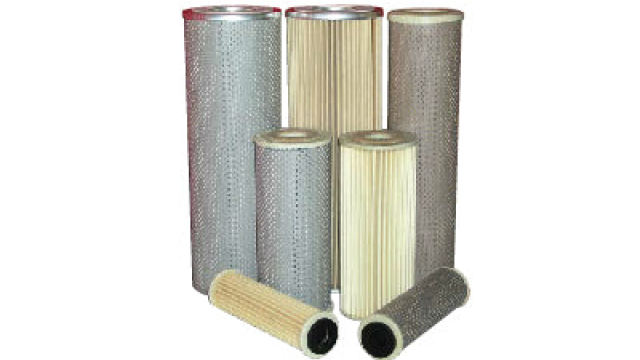In various industrial applications, hydraulic systems are crucial for powering machinery and equipment. A key component of these systems is the hydraulic filter, which plays a critical role in maintaining the efficiency and reliability of operations. Choosing the right hydraulic filter for your equipment is essential for ensuring optimal performance and extending the lifespan of your machinery. In this comprehensive guide, we’ll explore the factors to consider when selecting a hydraulic filter, as well as tips for making the right choice.
Understanding Hydraulic Filters
Hydraulic filters are designed to remove contaminants from hydraulic fluids, such as oil or water-glycol, to prevent damage to hydraulic components and ensure smooth operation. They typically consist of a filter medium, housing, and various components to support filtration and fluid flow.

Factors to Consider When Choosing a Hydraulic Filter
When selecting a hydraulic filter for your equipment, it’s important to consider several factors to ensure optimal performance and reliability. Let’s elaborate on each factor:
- Fluid Compatibility: Hydraulic filters must be compatible with the type of hydraulic fluid used in your equipment. Different fluids have unique chemical compositions and properties, so choosing a filter that is compatible with your fluid is crucial to prevent damage or degradation. For example, some fluids may require filters with specific materials or coatings to resist corrosion or maintain compatibility.
- Filtration Efficiency: The filtration efficiency of a hydraulic filter determines its ability to remove contaminants from the hydraulic fluid effectively. Contaminants such as dirt, debris, and particles can cause damage to hydraulic components if not properly filtered out. Therefore, it’s essential to choose a filter with a high filtration efficiency to maintain system cleanliness and protect sensitive components.
Filters are often rated based on their Beta ratio, which indicates the filter’s ability to remove particles of a certain size. A higher Beta ratio means better filtration efficiency. Additionally, consider the filter’s dirt-holding capacity, which determines how much contamination it can hold before needing replacement.
- Micron Rating: The micron rating of a hydraulic filter refers to the size of particles that it can effectively capture. Hydraulic systems typically require filters with micron ratings ranging from 3 to 25 microns, depending on the application. Larger particles can cause damage to components, while smaller particles can affect system performance and efficiency.
It’s important to select a filter with an appropriate micron rating based on the size and type of contaminants present in your hydraulic system. For example, if your equipment operates in a particularly dirty environment, you may need a filter with a lower micron rating to capture smaller particles effectively.
- Flow Rate: The flow rate of the hydraulic system refers to the volume of fluid that passes through the filter within a given time. It’s essential to choose a filter that can handle the required flow rate without causing excessive pressure drop or flow restriction. Insufficient flow can lead to reduced system performance, while excessive flow can cause the filter to bypass contaminants, resulting in potential damage to components.
When selecting a hydraulic filter, consider factors such as the size of the hydraulic system, the flow rate of the fluid, and the maximum allowable pressure drop. Choosing a filter with the correct flow rate ensures proper fluid circulation and system efficiency.
- Pressure Rating: The pressure rating of a hydraulic filter indicates the maximum pressure it can withstand without failure. Hydraulic systems operate under high pressure, so it’s crucial to select a filter that can handle the maximum system pressure to prevent leaks or ruptures.
When choosing a hydraulic filter, ensure that its pressure rating exceeds the maximum operating pressure of your equipment. This provides a safety margin and ensures reliable performance under all operating conditions.
- Temperature Range: Hydraulic systems can operate in a wide range of temperatures, from extreme cold to high heat. It’s essential to choose a hydraulic filter that can withstand the temperature extremes of your equipment’s operating environment without compromising performance.
High temperatures can degrade filter materials or cause them to soften, while low temperatures can affect fluid viscosity and flow rates. Select a filter with materials and construction suitable for the temperature range of your application to ensure long-term reliability and performance.
- Filter Type: Hydraulic filters come in various types, each with its own advantages and applications. Common types include in-line filters, tank-top filters, spin-on filters, and cartridge filters. The choice of filter type depends on factors such as space constraints, ease of installation, and maintenance requirements.
- In-line filters: Installed directly in the hydraulic line and offer high filtration efficiency.
- Tank-top filters: Mounted on the top of the hydraulic reservoir and are ideal for systems with limited space.
- Spin-on filters: Screw directly onto the filter head and are easy to replace.
- Cartridge filters: Inserted into a housing and offer flexibility in choosing the filter media.
Consider the specific requirements of your equipment and select the appropriate filter type that best suits your application.
- Maintenance Requirements: Finally, consider the maintenance requirements of the hydraulic filter. Choose a filter that is easy to install, replace, and maintain to minimize downtime and ensure uninterrupted operation. Filters with features such as quick-release mechanisms or indicator lights for filter replacement can simplify maintenance tasks.
Regular filter maintenance is essential to ensure optimal performance and prolong the lifespan of your hydraulic system. Develop a proactive maintenance schedule that includes routine inspection and replacement of hydraulic filters as needed.

Tips for Choosing the Right Hydraulic Filter
- Consult with Experts: Seek advice from hydraulic system experts or manufacturers to determine the most suitable filter for your equipment based on its specifications and operating conditions.
- Review Equipment Manuals: Refer to equipment manuals and specifications to identify the recommended hydraulic filter types, sizes, and ratings.
- Evaluate Filtration Needs: Assess the specific filtration needs of your equipment, including the type and size of contaminants to be removed, to determine the most appropriate filter specifications.
- Consider Long-Term Costs: While upfront costs are important, consider the long-term costs associated with filter replacement, maintenance, and potential equipment damage due to inadequate filtration.
- Perform Regular Maintenance: Implement a proactive maintenance schedule for your hydraulic system, including regular inspection and replacement of hydraulic filters to ensure optimal performance and longevity.
- Monitor System Performance: Monitor the performance of your hydraulic system regularly, including fluid cleanliness, pressure levels, and component condition, to identify any issues that may require adjustment or filter replacement.
Conclusion
Choosing the right hydraulic filter in Wrentham for your equipment is crucial for maintaining optimal performance, protecting components, and extending equipment lifespan. By considering factors such as fluid compatibility, filtration efficiency, flow rate, pressure rating, and maintenance requirements, you can ensure that your hydraulic system operates smoothly and efficiently.
Consulting with experts, reviewing equipment manuals, evaluating filtration needs, considering long-term costs, performing regular maintenance, and monitoring system performance are key steps in selecting the appropriate hydraulic filter.
Investing time and effort into choosing the right hydraulic filter will ultimately result in improved equipment reliability, reduced downtime, and cost savings over the long term. With the right filter in place, you can ensure that your hydraulic equipment operates at its best, maximizing productivity and minimizing maintenance issues.



